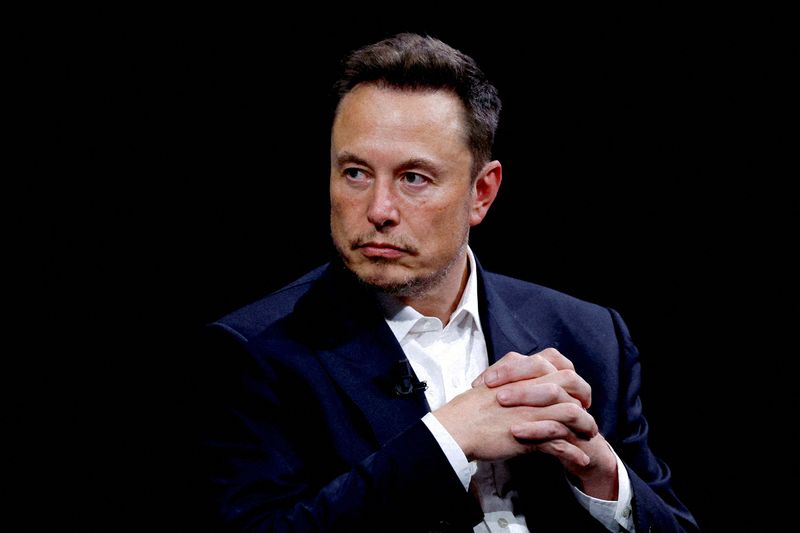By Tom Hals and Jody Godoy
(Reuters) – Tesla (NASDAQ:) and Elon Musk are using an obscure provision of corporate law to try to restore Musk’s $56 billion pay package, in an untested move that could once again mire the company in litigation, legal experts said.
The electric vehicle maker on Wednesday proposed putting Musk’s 2018 pay deal to a shareholder vote, though a Delaware judge struck it down in January.
Tesla is using a little-known section of Delaware corporate law that allows companies to correct procedural flaws that would otherwise override board decisions.
Tesla called the approach “novel” in its securities filing and said the special board committee that approved it could not predict how it would be treated under Delaware law.
Eric Talley, a professor at Columbia Law School, said the provision is intended to be a “Band-Aid” for the board’s technical errors, not to overturn major court rulings.
Tesla said in the proposal that thousands of shareholders were enraged by the ruling by Delaware Chancellor Kathaleen McCormick (NYSE:), which found that Tesla directors were not independent when they recommended the “unfathomable” package and failed to negotiate with Musk.
McCormick has determined, after years of litigation and a week-long trial, that these and other key details were withheld from investors before they voted to approve the compensation package.
Tesla proposed to solve the problem in two ways. In an effort to remove conflicts on the board, he asked an independent director, Kathleen Wilson-Thompson, to review the 2018 compensation agreement to decide whether it was in the best interests of shareholders.
It will also give shareholders the chance to vote again after reviewing McCormick’s results. Shareholders will have 120 days to contest the proposal if it is approved.
Tesla made no attempt to correct the flaws in the negotiations identified by McCormick. According to the company’s proposal, the company did not propose a new compensation package to Musk or hire new compensation consultants to review the record-breaking pay deal.
If shareholders approve, Talley and others said that could make it easier for Musk to win on appeal in the Delaware Supreme Court, because it could shift the burden to plaintiffs to prove that Musk’s pay is unfair. In the process, Musk had to prove that the pay and process were fair.
But other experts said the proposal was all but guaranteed to invite further lawsuits from shareholders.
In part, that’s because the pay package went into effect in 2018 and rewarded Musk if Tesla reached certain milestones, which it soon did. Musk received options to buy about 304 million Tesla shares at a steep discount, although he never exercised those options.
Ann Lipton, a business law professor at Tulane University, said it was unclear whether Tesla could now pay Musk not for achieving future milestones, but for past performance. You said it could be considered a waste of company assets.
“They’re saying we’re essentially giving them money because we like it so much and for no other reason. This is not something you can ratify simply by a majority vote of shareholders,” he said.
The proposal announced by the company on Wednesday raises the question of whether board decisions that allegedly violate fiduciary duties to investors can be reversed by leaving shareholders, rather than a judge, to decide what is acceptable.

Delaware legal experts said they knew of no precedent in overcoming a court ruling by using a shareholder vote in this way.
“This is the $56 billion question,” said Larry Hamermesh, a professor at Widener University Delaware Law School. “Their position is clearly that all we need to do is for shareholders to say: ‘Oh, no, we, we hear you, Chancellor, but that’s fine with us.’”